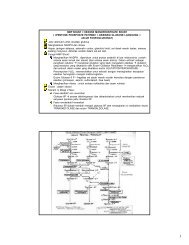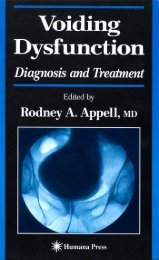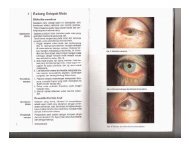- Page 2 and 3:
International Handbook of Clinical
- Page 4 and 5:
Copyright # 2001by John Wiley & Son
- Page 6 and 7:
vi CONTENTS PART IV SPECIFIC DISORD
- Page 8 and 9:
Contributors Peter B. Bloom,MD Depa
- Page 10 and 11:
Preface The editors of this volume,
- Page 12 and 13:
1 International Handbook of Clinica
- Page 14 and 15:
INTRODUCTION 5 1988) have all but i
- Page 16 and 17:
INTRODUCTION 7 of chemical anesthes
- Page 18 and 19:
INTRODUCTION 9 two relevant memory
- Page 20 and 21:
INTRODUCTION 11 problem. The author
- Page 22 and 23:
INTRODUCTION 13 goal, or the aim of
- Page 24 and 25:
INTRODUCTION 15 illnesses such as c
- Page 26 and 27:
INTRODUCTION 17 reporting of the pe
- Page 28 and 29:
20 INTERNATIONAL HANDBOOK OF CLINIC
- Page 30 and 31:
22 INTERNATIONAL HANDBOOK OF CLINIC
- Page 32 and 33:
24 INTERNATIONAL HANDBOOK OF CLINIC
- Page 34 and 35:
26 INTERNATIONAL HANDBOOK OF CLINIC
- Page 36 and 37:
28 INTERNATIONAL HANDBOOK OF CLINIC
- Page 38 and 39:
30 INTERNATIONAL HANDBOOK OF CLINIC
- Page 40 and 41:
32 INTERNATIONAL HANDBOOK OF CLINIC
- Page 42 and 43:
3 International Handbook of Clinica
- Page 44 and 45:
PATIENT SELECTION 37 render a clien
- Page 46 and 47:
PATIENT SELECTION 39 der Kolk, 1987
- Page 48 and 49:
PATIENT SELECTION 41 somatically an
- Page 50 and 51:
PATIENT SELECTION 43 or movie techn
- Page 52 and 53:
PATIENT SELECTION 45 the area of pa
- Page 54 and 55:
PATIENT SELECTION 47 Northrup, C. 1
- Page 56 and 57:
50 INTERNATIONAL HANDBOOK OF CLINIC
- Page 58 and 59:
52 INTERNATIONAL HANDBOOK OF CLINIC
- Page 60 and 61:
54 INTERNATIONAL HANDBOOK OF CLINIC
- Page 62 and 63:
56 INTERNATIONAL HANDBOOK OF CLINIC
- Page 64 and 65:
58 INTERNATIONAL HANDBOOK OF CLINIC
- Page 66 and 67:
60 INTERNATIONAL HANDBOOK OF CLINIC
- Page 68 and 69:
62 INTERNATIONAL HANDBOOK OF CLINIC
- Page 70 and 71:
64 INTERNATIONAL HANDBOOK OF CLINIC
- Page 72 and 73:
66 INTERNATIONAL HANDBOOK OF CLINIC
- Page 74 and 75:
68 INTERNATIONAL HANDBOOK OF CLINIC
- Page 76 and 77:
70 INTERNATIONAL HANDBOOK OF CLINIC
- Page 78 and 79:
72 INTERNATIONAL HANDBOOK OF CLINIC
- Page 80 and 81:
74 INTERNATIONAL HANDBOOK OF CLINIC
- Page 82 and 83:
76 INTERNATIONAL HANDBOOK OF CLINIC
- Page 84 and 85:
78 INTERNATIONAL HANDBOOK OF CLINIC
- Page 86 and 87:
80 INTERNATIONAL HANDBOOK OF CLINIC
- Page 88 and 89: 82 INTERNATIONAL HANDBOOK OF CLINIC
- Page 90 and 91: 6 International Handbook of Clinica
- Page 92 and 93: INJUNCTIVE COMMUNICATION 87 Table 6
- Page 94 and 95: INJUNCTIVE COMMUNICATION 89 differe
- Page 96 and 97: INJUNCTIVE COMMUNICATION 91 one wil
- Page 98 and 99: INJUNCTIVE COMMUNICATION 93 THE THE
- Page 100 and 101: PART IV International Handbook of C
- Page 102 and 103: 98 INTERNATIONAL HANDBOOK OF CLINIC
- Page 104 and 105: 100 INTERNATIONAL HANDBOOK OF CLINI
- Page 106 and 107: 102 INTERNATIONAL HANDBOOK OF CLINI
- Page 108 and 109: 104 INTERNATIONAL HANDBOOK OF CLINI
- Page 110 and 111: 106 INTERNATIONAL HANDBOOK OF CLINI
- Page 112 and 113: 108 INTERNATIONAL HANDBOOK OF CLINI
- Page 114 and 115: 110 INTERNATIONAL HANDBOOK OF CLINI
- Page 116 and 117: 112 INTERNATIONAL HANDBOOK OF CLINI
- Page 118 and 119: 114 INTERNATIONAL HANDBOOK OF CLINI
- Page 120 and 121: 116 INTERNATIONAL HANDBOOK OF CLINI
- Page 122 and 123: 118 INTERNATIONAL HANDBOOK OF CLINI
- Page 124 and 125: 120 INTERNATIONAL HANDBOOK OF CLINI
- Page 126 and 127: 122 INTERNATIONAL HANDBOOK OF CLINI
- Page 128 and 129: 124 INTERNATIONAL HANDBOOK OF CLINI
- Page 130 and 131: 126 INTERNATIONAL HANDBOOK OF CLINI
- Page 132 and 133: 9 International Handbook of Clinica
- Page 134 and 135: HYPNOSIS AND DEPRESSION 131 THE DEF
- Page 136 and 137: HYPNOSIS AND DEPRESSION 133 associa
- Page 140 and 141: HYPNOSIS AND DEPRESSION 137 depress
- Page 142 and 143: HYPNOSIS AND DEPRESSION 139 has any
- Page 144 and 145: HYPNOSIS AND DEPRESSION 141 Beckham
- Page 146 and 147: 10 International Handbook of Clinic
- Page 148 and 149: HYPNOSIS, DISSOCIATION AND TRAUMA 1
- Page 150 and 151: HYPNOSIS, DISSOCIATION AND TRAUMA 1
- Page 152 and 153: HYPNOSIS, DISSOCIATION AND TRAUMA 1
- Page 154 and 155: HYPNOSIS, DISSOCIATION AND TRAUMA 1
- Page 156 and 157: HYPNOSIS, DISSOCIATION AND TRAUMA 1
- Page 158 and 159: HYPNOSIS, DISSOCIATION AND TRAUMA 1
- Page 160 and 161: HYPNOSIS, DISSOCIATION AND TRAUMA 1
- Page 162 and 163: 11 Conversion Disorders C. A. L. HO
- Page 164 and 165: CONVERSION DISORDERS 161 van der Ko
- Page 166 and 167: CONVERSION DISORDERS 163 imitates t
- Page 168 and 169: CONVERSION DISORDERS 165 On examina
- Page 170 and 171: CONVERSION DISORDERS 167 plained de
- Page 172 and 173: CONVERSION DISORDERS 169 and physio
- Page 174 and 175: 12 International Handbook of Clinic
- Page 176 and 177: PERSONALITY AND PSYCHOTIC DISORDERS
- Page 178 and 179: PERSONALITY AND PSYCHOTIC DISORDERS
- Page 180 and 181: PERSONALITY AND PSYCHOTIC DISORDERS
- Page 182 and 183: PERSONALITY AND PSYCHOTIC DISORDERS
- Page 184 and 185: PERSONALITY AND PSYCHOTIC DISORDERS
- Page 186 and 187: PERSONALITY AND PSYCHOTIC DISORDERS
- Page 188 and 189:
PERSONALITY AND PSYCHOTIC DISORDERS
- Page 190 and 191:
13 International Handbook of Clinic
- Page 192 and 193:
DISSOCIATIVE DISORDERS 189 1994; Sp
- Page 194 and 195:
DISSOCIATIVE DISORDERS 191 Under no
- Page 196 and 197:
DISSOCIATIVE DISORDERS 193 affect r
- Page 198 and 199:
DISSOCIATIVE DISORDERS 195 identity
- Page 200 and 201:
DISSOCIATIVE DISORDERS 197 Table 13
- Page 202 and 203:
DISSOCIATIVE DISORDERS 199 hypnotic
- Page 204 and 205:
DISSOCIATIVE DISORDERS 201 Alpert,
- Page 206 and 207:
DISSOCIATIVE DISORDERS 203 Kluft, R
- Page 208 and 209:
14 International Handbook of Clinic
- Page 210 and 211:
EATING DISORDERS 207 1. `I sometime
- Page 212 and 213:
EATING DISORDERS 209 EGO-STRENGTHEN
- Page 214 and 215:
EATING DISORDERS 211 relates to act
- Page 216 and 217:
EATING DISORDERS 213 apartment, enj
- Page 218 and 219:
EATING DISORDERS 215 EGO STATE THER
- Page 220 and 221:
EATING DISORDERS 217 Brown, D. P. &
- Page 222 and 223:
EATING DISORDERS 219 Torem, M. S. 1
- Page 224 and 225:
222 INTERNATIONAL HANDBOOK OF CLINI
- Page 226 and 227:
224 INTERNATIONAL HANDBOOK OF CLINI
- Page 228 and 229:
226 INTERNATIONAL HANDBOOK OF CLINI
- Page 230 and 231:
228 INTERNATIONAL HANDBOOK OF CLINI
- Page 232 and 233:
230 INTERNATIONAL HANDBOOK OF CLINI
- Page 234 and 235:
232 INTERNATIONAL HANDBOOK OF CLINI
- Page 236 and 237:
234 INTERNATIONAL HANDBOOK OF CLINI
- Page 238 and 239:
236 INTERNATIONAL HANDBOOK OF CLINI
- Page 240 and 241:
238 INTERNATIONAL HANDBOOK OF CLINI
- Page 242 and 243:
240 INTERNATIONAL HANDBOOK OF CLINI
- Page 244 and 245:
242 INTERNATIONAL HANDBOOK OF CLINI
- Page 246 and 247:
244 INTERNATIONAL HANDBOOK OF CLINI
- Page 248 and 249:
246 INTERNATIONAL HANDBOOK OF CLINI
- Page 250 and 251:
248 INTERNATIONAL HANDBOOK OF CLINI
- Page 252 and 253:
250 INTERNATIONAL HANDBOOK OF CLINI
- Page 254 and 255:
252 INTERNATIONAL HANDBOOK OF CLINI
- Page 256 and 257:
254 INTERNATIONAL HANDBOOK OF CLINI
- Page 258 and 259:
256 INTERNATIONAL HANDBOOK OF CLINI
- Page 260 and 261:
258 INTERNATIONAL HANDBOOK OF CLINI
- Page 262 and 263:
260 INTERNATIONAL HANDBOOK OF CLINI
- Page 264 and 265:
262 INTERNATIONAL HANDBOOK OF CLINI
- Page 266 and 267:
264 INTERNATIONAL HANDBOOK OF CLINI
- Page 268 and 269:
266 INTERNATIONAL HANDBOOK OF CLINI
- Page 270 and 271:
268 INTERNATIONAL HANDBOOK OF CLINI
- Page 272 and 273:
270 INTERNATIONAL HANDBOOK OF CLINI
- Page 274 and 275:
19 International Handbook of Clinic
- Page 276 and 277:
TREATMENT OF BURN PATIENTS 275 and
- Page 278 and 279:
TREATMENT OF BURN PATIENTS 277 as t
- Page 280 and 281:
TREATMENT OF BURN PATIENTS 279 Opio
- Page 282 and 283:
TREATMENT OF BURN PATIENTS 281 NUTR
- Page 284 and 285:
TREATMENT OF BURN PATIENTS 283 Ewin
- Page 286 and 287:
20 Hypnosis in Dentistry DOV GLAZER
- Page 288 and 289:
HYPNOSIS IN DENTISTRY 287 and pract
- Page 290 and 291:
HYPNOSIS IN DENTISTRY 289 cue to le
- Page 292 and 293:
HYPNOSIS IN DENTISTRY 291 personal
- Page 294 and 295:
HYPNOSIS IN DENTISTRY 293 may be th
- Page 296 and 297:
HYPNOSIS IN DENTISTRY 295 appearanc
- Page 298 and 299:
HYPNOSIS IN DENTISTRY 297 NITROUS O
- Page 300 and 301:
21 International Handbook of Clinic
- Page 302 and 303:
DENTAL ANXIETY DISORDERS 301 nosis
- Page 304 and 305:
DENTAL ANXIETY DISORDERS 303 HYPNOT
- Page 306 and 307:
DENTAL ANXIETY DISORDERS 305 dynami
- Page 308 and 309:
DENTAL ANXIETY DISORDERS 307 Gersch
- Page 310 and 311:
310 INTERNATIONAL HANDBOOK OF CLINI
- Page 312 and 313:
312 INTERNATIONAL HANDBOOK OF CLINI
- Page 314 and 315:
314 INTERNATIONAL HANDBOOK OF CLINI
- Page 316 and 317:
316 INTERNATIONAL HANDBOOK OF CLINI
- Page 318 and 319:
318 INTERNATIONAL HANDBOOK OF CLINI
- Page 320 and 321:
320 INTERNATIONAL HANDBOOK OF CLINI
- Page 322 and 323:
322 INTERNATIONAL HANDBOOK OF CLINI
- Page 324 and 325:
324 INTERNATIONAL HANDBOOK OF CLINI
- Page 326 and 327:
23 International Handbook of Clinic
- Page 328 and 329:
NEGATIVE CONSEQUENCES OF HYPNOSIS 3
- Page 330 and 331:
NEGATIVE CONSEQUENCES OF HYPNOSIS 3
- Page 332 and 333:
NEGATIVE CONSEQUENCES OF HYPNOSIS 3
- Page 334 and 335:
Index International Handbook of Cli
- Page 336 and 337:
INDEX 337 hypnosis combination for
- Page 338 and 339:
INDEX 339 coping 15, 116 children 3
- Page 340 and 341:
INDEX 341 sexual dysfunction 234, 2
- Page 342 and 343:
INDEX 343 hemispheric involvement i
- Page 344 and 345:
INDEX 345 litigation, chronic pain
- Page 346 and 347:
INDEX 347 contraindications 45 cues
- Page 348 and 349:
INDEX 349 age regression 25 pulmona
- Page 350 and 351:
INDEX 351 age regression 239 anxiet
- Page 352:
INDEX 353 dissociation 148, 150±1,


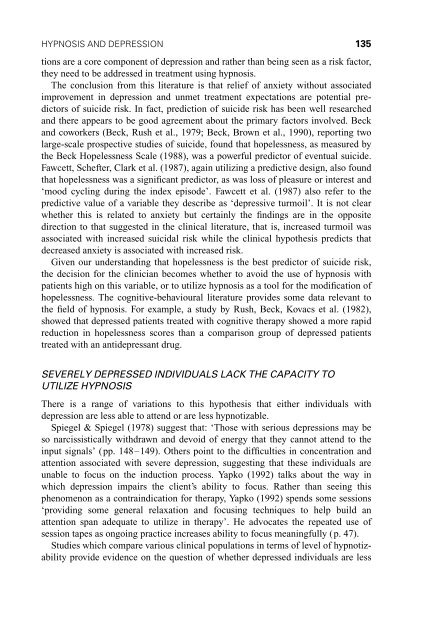


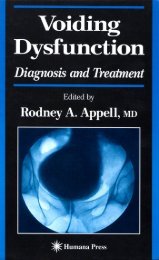


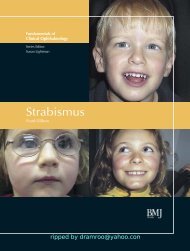


![SISTEM SENSORY [Compatibility Mode].pdf](https://img.yumpu.com/20667975/1/190x245/sistem-sensory-compatibility-modepdf.jpg?quality=85)
